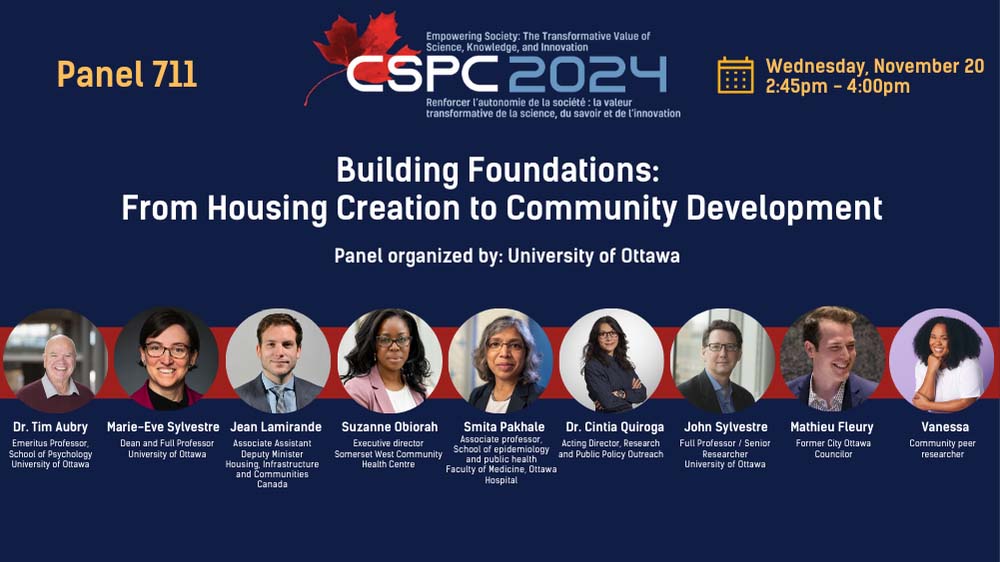Abstract:
The housing crisis in Canada presents complex challenges that require multifaceted and collaborative solutions. This panel, organized by the University of Ottawa, explores the continuum of housing development, from the creation of affordable housing to the fostering of supportive and sustainable communities. Our interdisciplinary panel brings together seven distinguished speakers, from academia, government, community, and health sectors, contributing diverse insights into various stages of housing and community development to address the housing crisis. They will discuss the processes and policies necessary to create affordable housing for vulnerable populations, design supportive environments and foster sustainable community development.
Summary of Conversations
The discussion centred on Canada’s housing and homelessness crisis, highlighting factors such as population growth, low vacancy rates, and insufficient income support. Strategies like Housing First were noted as effective but inconsistently implemented. The conversation addressed challenges in matching available solutions with the needs of individuals, emphasizing the disproportionate impact on racialized and Indigenous communities. A humane approach to policy was advocated, considering the complex circumstances leading to homelessness. The discussion also highlighted the importance of integrating community voices and lived experiences into the development and delivery of support services, with examples showcasing positive outcomes when people are meaningfully involved in addressing their own needs. Data collection, coordinated efforts across government levels, and addressing the root causes of instability were emphasized as crucial for sustainable community development.
Take Away Messages/ Current Status of Challenges
- Homelessness rates are increasing, with a rise in chronic homelessness and unsheltered individuals.
- Existing systems of care are largely emergency-based and lack evidence-based approaches.
- Racialized and Indigenous communities are disproportionately affected by homelessness, indicating systemic challenges.
- Mental health and substance use challenges significantly impact individuals’ ability to secure and maintain housing.
- Data on housing at the local level is lacking and uneven across the country.
- Nimbyism and negative rhetoric create barriers to implementing effective solutions like supportive housing.
- There is a need for a better understanding of effective preventive strategies
- Coordination between different levels of government and community partners is a major challenge and opportunity.
Recommendations/Next Steps
- Bolster existing tools and levers, such as rent-geared-to-income housing, co-op housing, and social housing.
- Prioritize a humane approach in policy work, ensuring that everyone is fulfilled with the right to be housed.
- Implement community-based research and programs that meaningfully involve people with lived experience.
- Develop comprehensive strategies that address the root causes of homelessness, including mental health, addiction, and poverty.
- Streamline processes for land transfers and disposal for affordable public housing construction.
- Improve data collection at the local level to inform housing needs assessments and planning.
- Scale up the non-market housing sector, including cooperative housing, to provide viable options for those not served by the market.
- Focus on evidence-based strategies like housing first and rapid rehousing to ensure effective interventions.
* This summary is generated with the assistance of AI tools


